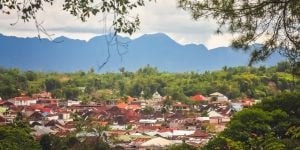
Like many expatriates, are you considering retiring to an idyllic island destination, enjoying some of the world's most beautiful beaches while savoring a well-deserved retreat in an enchanting location? If your answer is yes, then Indonesia should be just what you're looking for. Here is some practical information on how to qualify for a retirement visa in Indonesia.
Many expats have decided to turn to Indonesia as the ultimate destination to live their retirement life. With world-class food, heavenly beaches, and a lifestyle that is totally laid back, luxurious and affordable, Indonesia is the perfect retreat for many retirees. However, as with all good things, moving to Indonesia in the long term requires some serious planning, and that includes having a good knowledge of the necessary visa requirements. First of all, you should know that there are several categories of visas that are needed to enter and/or live in Indonesia, and sometimes that it can be difficult to advance within the administrative maze.
The most important document you will need for living your dream retirement life in Indonesia is the Retirement Visa. It can only be issued to citizens of certain countries but, unfortunately, does not allow you to spend your entire retirement period in Indonesia. However, after a while, it can give access to yet another document that embodies the sesame for expatriates in Indonesia: the KITAP, or permanent residence permit.
The retirement visa in Indonesia
Foreigners over 55 years of age can apply for a KITAS if they wish to retire in Indonesia. To do so, they must provide the Indonesian authorities with a letter of endorsement from an approved travel agent. Be aware that this document must be approved by the Ministry of Tourism; otherwise, it will not be valid.
A limited stay permit, also known as Kartu Izin Tinggal Terbatas (KITAS), costs US$180 ($50 application fee and $90 per year). It allows you to stay in Indonesia for two years and is renewable twice. From there, you can apply for a Multiple Entry and Return Permit (MERP), which is valid for as long as the KITAS. This document grants you the right to exit and enter Indonesia with the same limited stay permit. This gives the recipients of this type of residence permit the flexibility to come and go as they please and live anywhere in the country.
However, if you are retired and/or over 55, you will need to apply for a special KITAS, also known in Indonesia as a retiree visa. Like the normal KITAS, it is also a temporary and renewable visa. However, the retiree visa does not include the same benefits as the regular KITAS; for example, it is only valid for one year and renewable only four times.
Requirements for a retirement visa
As an applicant for a retirement visa, you will have to go through a series of administrative procedures. First of all, you need to know that there are certain requirements to be met if you want to spend your dream retirement in Indonesia. The first requirement is that the minimum age requirement for applicants for a retirement visa in Indonesia is at least 55 years old. In other words, if you are not over 55 years old, you will not be eligible, even if you can prove that you are in professional retirement.
Since this is not the case everywhere, it is better to specify. The other conditions attached to obtaining a retirement visa in Indonesia are as follows:
- The applicant does not intend to work in Indonesia.
- The applicant has a pension fund or other means to support themselves in Indonesia without having to work.
- The applicant has financial means of at least USD 18,000 per year.
- The applicant has health insurance in Indonesia.
- The applicant has signed a rental agreement for at least one year for their residence in Indonesia.
- The applicant is committed to employing at least one housekeeper, servant or driver.
Remember that as an applicant for a retirement visa, you will have to provide a document whereby you agree not to work on Indonesian soil. If you do not fulfill this commitment, the document will be considered proof that you have committed an offense and are liable to prosecution by the state for unauthorized work. Since the penalties are severe, it is highly advisable to avoid putting yourself in a situation that would expose you to such legal action and jeopardize your stay in Indonesia.
Applicants who meet all the prerequisites can apply for a retiree visa in Indonesia, but only if they are from one of the following countries: Argentina, Australia, Austria, Bahrain, Belgium, Brazil, Brunei, Darussalam, Bulgaria, Canada, Cyprus, Denmark, Egypt, Estonia, Finland, France, Germany, Greece, Hungary, India, Iran, Iceland, Ireland, Italy, Japan, Kuwait. Liechtenstein, Luxembourg, Malaysia, Maldives, Malta, Monaco, Netherlands, New Zealand, Norway, Oman, Philippines, Poland, Portugal, Qatar, Saudi Arabia, Singapore, South Africa, South Korea, Spain, Surinam, Sweden, Switzerland, Taiwan, Thailand, United Arab Emirates, United Kingdom or the United States of America.
Administrative procedure for obtaining a retirement visa in Indonesia
According to the website of the General Directorate of Immigration of Indonesia, any foreigner wishing to retire in Indonesia must submit the following documents when applying for a limited stay visa:
- A guarantor: the travel agency will submit the beneficiary's application to the Directorate General of Immigration and make the initial payment of IDR 100,000. Once this application is approved, the beneficiary will be sent a copy of the visa approval letter, while another copy will be sent to their nearest Indonesian embassy/consulate.
- The applicant must then go to the nearest Indonesian embassy/consulate to obtain their limited stay permit (VITAS) and pay the required fee. They will then be able to travel to Indonesia and obtain an entry stamp at the border after presenting their VITAS.
- Once in Indonesia, the visa recipient must report to the immigration office in their area of residence within 30 days of arrival in Indonesia to convert their VITAS to KITAS. They will be interviewed, and their biometric data will be recorded and verified, including fingerprints, photo and signature. The applicant will also have to pay the fee for their limited residence permit (KITAS). The KITAS will then be issued within a maximum of four working days from the time their data is collected.
- The KITAS recipient will then receive the required civil status documents to live in Indonesia.
The easiest way to apply for a KITAS for retirement purposes in Indonesia is through an officially recognized travel agency that can be considered as your guarantor by the Indonesian authorities. The agency will then be recognized as the sponsor of your application to reside in Indonesia during your retirement. You can also choose to apply for your retirement visa online at your nearest embassy or consulate, provided of course that you are a citizen of one of the countries listed above. However, you should be aware that the procedures will be more complicated and time-consuming if you decide to do it yourself and without assistance.
Upon receipt of the Special Retirement KITAS, the beneficiary is considered a resident of Indonesia. Although not allowed to work in the country, the beneficiary will have to declare their global income and pay Indonesian personal income tax where necessary. To find out more about the different visas for Indonesia, please consult our articles on the subject or our expat forum in Indonesia, where other users of the site will be happy to guide and advise you on administrative and other procedures.
Be aware that the retirement visa is a temporary visa. Legally, this document only allows retired foreigners to stay in Indonesia for more than 60 days. This special visa is valid for one year and can be renewed up to five times. This means that the duration of your "retirement" in Indonesia will not exceed five years in total. You can apply for a retirement visa directly online at the Indonesian Consulate.
Once you are finished with all of your applications for an Indonesian retiree visa extension, only then can you apply for a KITAP, a permanent residence permit.
Permanent Residence Permit (KITAP)
The Indonesian Immigration Service allows foreigners over 55 years old to apply for a permanent residence permit only if they previously held a retirement visa, only if they have completed the four extensions granted for this visa, and only if they have scrupulously respected all the rules related to their expatriation to Indonesia (especially the commitment not to work). The cost of the procedure is affordable, and the requirements to obtain the permit are relatively simple. As always, it is advisable to contact the nearest Indonesian embassy or consulate before proceeding with your move to clarify the rules relating to your nationality. Immigration regulations may vary from country to country, depending on the state of Indonesia's relations with the respective country. Indonesian officials will be able to provide you with the most up-to-date information and advise you on how to obtain the appropriate permit.
Useful links:
Online visa application for Indonesia
We do our best to provide accurate and up to date information. However, if you have noticed any inaccuracies in this article, please let us know in the comments section below.








